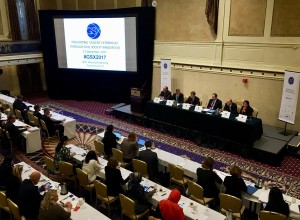
On 21 September, ICAN in partnership with The Prevention Project celebrated the first anniversary of the Global Solutions Exchange (GSX) by hosting an all-day event on “Preventing Violent Extremism through Civil Society Innovation” on the margins of the 2017 UN General Assembly meetings. Over 180 policymakers, and civil society practitioners came together to draw attention to the significant role that civil society plays in preventing violent extremism (PVE).
Partners from the Women’s Alliance for Security Leadership (WASL) from Kenya, Pakistan and Tunisia joined ICAN’s executive director Ms. Sanam Naraghi Anderlini to share their analysis and innovative practices in preventing violent extremism by promoting peace, resilience, equal rights, and pluralism (PREP). The event also included extraordinary youth, and other community leaders who highlighted their contributions to PVE and provided practical recommendations to improve current policies and practices
Moderating the session “A Whole of Society Approach”, Ms. Anderlini stated, “local women-led organizations and other CSOs felt the rise  of violent extremism years ago and have been at the frontlines of the fight against it with innovate, positive, and sustainable solutions”. Her words were reaffirmed as Bushra Qadeem Hyder, an educationalist and a WASL member from Pakistan pioneering work in promoting peace education curricula in schools has enabled her to directly prevent the radicalization of teenagers. They echoed the ICAN/WASL report Education, Identity and Rising Extremism: From Preventing Violent Extremism to Promoting Peace, Resilience, Equal Rights and Pluralism (PREP) that benefited from GSX thematic meetings in 2017. Omezzine Khelifa, the founder of Mobdiun in Tunisia, highlighted that “Youth have the most potential to become change makers in our society. With the right empowering tools, they can lead the progress in our society.” Attention to deeper economic structural reform was also addressed in the ICAN/WASL report From the Ground Up – The Nexus of Economic Policy, Gender and Violent Extremism that emerged from discussions at the GSX Economics roundtables held in March 2017.
of violent extremism years ago and have been at the frontlines of the fight against it with innovate, positive, and sustainable solutions”. Her words were reaffirmed as Bushra Qadeem Hyder, an educationalist and a WASL member from Pakistan pioneering work in promoting peace education curricula in schools has enabled her to directly prevent the radicalization of teenagers. They echoed the ICAN/WASL report Education, Identity and Rising Extremism: From Preventing Violent Extremism to Promoting Peace, Resilience, Equal Rights and Pluralism (PREP) that benefited from GSX thematic meetings in 2017. Omezzine Khelifa, the founder of Mobdiun in Tunisia, highlighted that “Youth have the most potential to become change makers in our society. With the right empowering tools, they can lead the progress in our society.” Attention to deeper economic structural reform was also addressed in the ICAN/WASL report From the Ground Up – The Nexus of Economic Policy, Gender and Violent Extremism that emerged from discussions at the GSX Economics roundtables held in March 2017.
During the session “Supporting the Rehabilitation and Reintegration of Violent Extremists”, the speakers shared their experience in dealing with the issue of returning terrorists within different sectors of society. Ms. Sureya Roble, executive director at Advocacy for Women in Peace and Security–Africa (AWAPSA), reflected on facilitating engagement between the police, victims of extremism and state violence, and communities in Kenya. Her outreach and engagement of young women caught in a web of poverty, oppression, trafficking and radicalization has shed light on previously invisible members of the community. Their urge for better community policing resonated with the ICAN/WASL Security brief Preventing Violent Extremism, Protecting Rights and Community Policing.
At a session dedicated to experiences of CSO and state collaboration on national action plans, Kenya’s Halima Salim executive director of Coast Education Centre (COEC) highlighted the absence of women’s voices and gender perspectives in the current plan and how COEC is filling this gap by consulting women and developing a Women’s PVE charter to inform and accompany the national strategy.
Speakers from the session “Engaging Cities, Local Authorities, and Grassroots Prevention Networks” discussed areas of improvement in the cooperation among local authorities, civil society and the private sector. They affirmed that local, multi-disciplinary networks are keys to preventing violence and building social cohesion while also sharing recommendations for legal and political PVE frameworks during the session “Safeguarding the Legal, Political, and Operational Space for Civil Society to Engage in PVE”. Political and financial support of leaders and governments, clarity of legal frameworks, and the empowerment of women and youth are essential for a more effective engagement of civil society in PVE.
Mr. Eric Rosand, director of The Prevention Project, joined Ms. Anderlini in highlighting the key elements of a “ Whole of Society” approach to PVE during their closing remarks by concluding that: “GSX2017 reminded us not only of the ways in which CSOs provide a first-line of defense against, but have some of the most innovative solutions to this threat. Sustained dialogue between governments and multilateral and these local actors must be strengthened”
